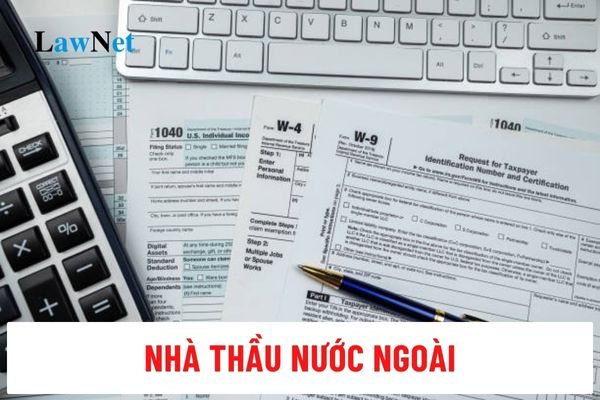Which types of taxes must foreign contractors pay when doing business in Vietnam?
Which types of taxes must foreign contractors pay when doing business in Vietnam?
According to Article 5 of Circular 103/2014/TT-BTC :
Applicable Taxes
1. Foreign contractors and foreign subcontractors as business entities shall fulfill the obligations of value-added tax (VAT) and corporate income tax (CIT) as guided in this Circular.
2. Foreign contractors and foreign subcontractors as individuals conducting business shall fulfill the obligations of VAT as guided in this Circular and personal income tax (PIT) as per the laws on PIT.
3. For other types of taxes, fees, and charges, foreign contractors and foreign subcontractors shall comply with the current legal documents on taxes, fees, and charges.
Thus, when doing business in Vietnam, foreign contractors must pay the following types of taxes:
- Foreign contractors and foreign subcontractors as business entities shall fulfill the obligations of VAT and CIT as guided in this Circular.
- Foreign contractors and foreign subcontractors as individuals conducting business shall fulfill the obligations of VAT as guided in this Circular and PIT as per the laws on PIT.
- For other types of taxes, fees, and charges, foreign contractors and foreign subcontractors shall comply with the current legal documents on taxes, fees, and charges.
What is the Form for tax declaration for foreign contractors doing business in Vietnam?
The Form for tax declaration for foreign contractors doing business in Vietnam is stipulated in Form No. 01/NTNN issued together with Circular No. 80/2021/TT-BTC:

>> Download Form for tax declaration for foreign contractors doing business in Vietnam

Which types of taxes must foreign contractors pay when doing business in Vietnam? (Image from Internet)
What are taxable incomes for CIT of foreign organizations doing business in Vietnam?
Based on Article 7 of Circular 103/2014/TT-BTC, the taxable income for CIT of foreign organizations doing business in Vietnam includes:
(1). Taxable income for CIT of foreign contractors and foreign subcontractors is income arising from the provision and distribution of goods; the provision of services and services associated with goods in Vietnam based on contractor agreements and subcontractor agreements (except as stipulated in Article 2, Chapter I of Circular 103/2014/TT-BTC).
(2). When goods are supplied in the following forms: the delivery point is within Vietnam's territory (except as stipulated in Clause 5, Article 2, Chapter I of Circular 103/2014/TT-BTC); or the supply of goods accompanied by services conducted in Vietnam such as marketing services, trade promotion activities, post-sale services, installation services, test-run, warranty, maintenance, replacement, and other services associated with the supply of goods (including free accompanying services), regardless of whether these services are included in the contract value, the taxable income for CIT of the foreign contractor and foreign subcontractor is the total value of goods and services.
(3). Income arising in Vietnam for the foreign contractor and foreign subcontractor is any income received in any form based on contractor agreements and subcontractor agreements (except as stipulated in Article 2, Chapter I of Circular 103/2014/TT-BTC), irrespective of the location of business activities of the foreign contractor and foreign subcontractor.
Taxable income for foreign contractors and foreign subcontractors in specific cases includes:
- Income from the transfer of ownership rights, usage rights of assets; transfer of participation rights in economic contracts/projects in Vietnam, transfer of property rights in Vietnam.
- Income from royalties, which are any income paid for the use or transfer of intellectual property rights and technology transfer, software copyright (including payments for the use and transfer of author's rights and ownership rights over works; transfer of industrial property rights; technology transfer, software copyright).
"Author's rights, ownership rights over works," "Industrial property rights," "Technology transfer" as defined in the Civil Code, the Intellectual Property Law, Technology Transfer Law 2017, and their guiding documents.
- Income from the transfer, liquidation of assets.
- Interest income: income from the lender from any form of lending, whether or not such loan is secured, whether or not the lender enjoys the borrower's profit; income from interest on deposits (except for interest on deposits of foreign individuals and interest on deposits for maintaining operation in Vietnam by diplomatic missions, representative offices of international organizations, and non-governmental organizations in Vietnam), including any rewards accompanying deposit interest (if any); income from delayed payment interest as stipulated in contracts; income from bond interest, bond discounting (except for tax-exempt bonds), treasury bills; income from interest on certificates of deposit.
Interest income includes any fees that the Vietnamese party must pay according to the contract.
- Income from the transfer of securities.
- Compensation and damages received from contract breaching partners.
- Other incomes as stipulated by law.

